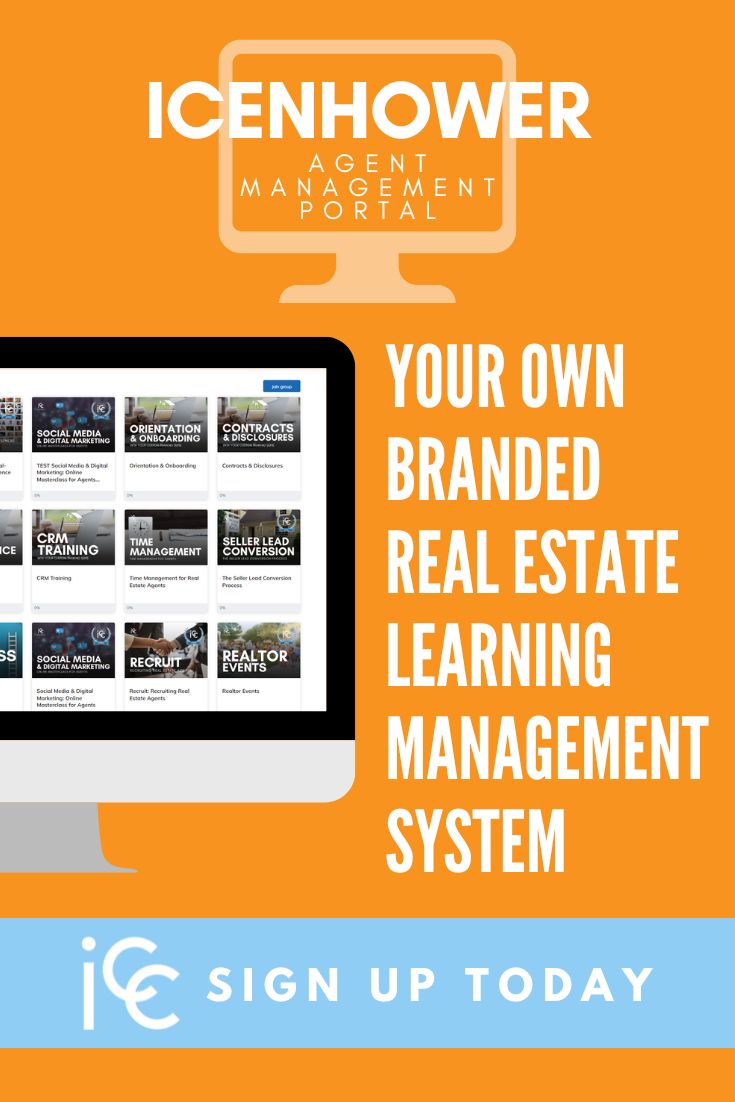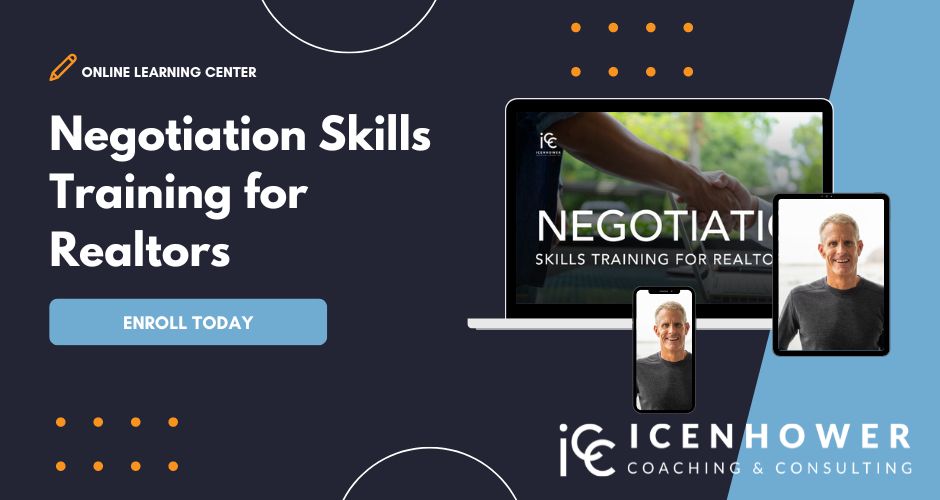Hone your real estate agent communication skills by using the FORD Questions and creating more value for your clients.
Today we are going to talk about real estate agent communication skills and sales techniques. We aren’t talking about learning scripts that will trick your clients, we’re talking about learning ways to better serve and solve our clients’ problems. Often, as Realtors, we are tasked with solving a need or a want that our client didn’t even know they had! At Icenhower Coaching and Consulting, we constantly teach our students and clients to find ways to add value. By learning how to properly communicate, you are adding a tremendous value to every client.
VIDEO: Real Estate Agent Communication Skills: Creating Value and the FORD Questions
Why is better communication so important?
Remember, the end goal of learning better real estate agent communication skills is to attract people to you. You shouldn’t feel the need to persuade people to listen to what you have to say. If you are providing value, they will come to you all on their own.
There are two facets to being a successful Realtor. You must be likable and create value.
- Be likeable. People tend to move toward someone they know, like, or trust. So you need to position yourself as a likable, approachable person, and a trusted advisor. Yes, we are salespeople, but that doesn’t mean that we need to fall into that stereotype. Remember that your clients are trusting you with likely the most expensive transaction of their life.
- Create value. People tend to move toward something that will give them value. Your mission is to provide a service that brings value to your clients.
We get so many questions from real estate agents about what scripts to use to convert more leads. We also get many questions about how to handle objections and how to convince potential clients to move forward.
But here’s the thing — most real estate agents talk way too much. They don’t listen enough. If you are conducting a listing presentation, for example, and you find yourself monologuing, you are turning your customer off. If you do this, you will have a hard time converting leads and creating value for your customer. Remember, you need to be likable as a trusted advisor, and you need to create value. Instead of talking constantly, listen more. If you ask the right questions (more on that in a moment) you’ll create a dynamic conversation.
What do people value?
People value two things. First, they value anything that solves their problem or eases their pain. Not necessarily physical pain, but something that might be mentally/emotionally painful for them. Second, they value anything that brings them pleasure. People will move toward something that makes them feel good. It’s important to find the pain points and pleasure points of your potential client so you can understand how to bring them value.
Examples of pain points: lost job, divorce, loved one has an illness, children graduating and moving away, elderly parent moving in, long commute to work, etc.
Examples of pleasure points: job promotion, inherited money, birth of a child, newfound hobby, success of child, marriage, etc.
When you are talking to potential clients, you are looking for changes in their lives. When you sit down with your client to do an Annual Property Analysis, you ask FORD Questions (which we will detail in a moment.) During these questions, as their trusted real estate advisor, you can listen for the change in their voice as they answer. Can you hear any pain points? What about pleasure points? You can make mental notes or actually write down what you hear as they answer your questions.

Use FORD Questions to improve your real estate agent communication skills
The following FORD Questions will unlock the motivations of your potential client while also improving your rapport. These are dynamic questions that force you to listen, not just talk. Use these FORD questions to further identify pain points and pleasure points.
F – Family questions. Examples: How’s your family doing? When does your son graduate? I saw on Facebook that your family went on a ski trip — how was it? How’s your daughter enjoying soccer this season?
O – Occupation questions. Examples: How’s business? What field do you work in? How’s everything at work?
R – Recreation questions. Examples: What do you do for fun? Did you go to the game last weekend? How often do you drive up to the mountains to ski? Have you been out to the lake lately?
D- Dreams questions. Examples: What are you hoping to do for the holidays? Do you have any trips you’re excited about this summer? What is your daughter hoping to do after she graduates?
Examples using the FORD Questions
Example: Hey, how’s business going? Well, not great actually. I think I’m going to be losing my job soon because my work is downsizing. You’ve identified a point point.
Example: How’s your son enjoying college? Well, it wasn’t the best fit for him, and he dropped out. It looks like he will likely be moving back in with us soon. You’ve identified a pain point.
Example: How’s work been lately? I just got a big promotion! I’m so excited — I even get to move into a bigger office. You’ve identified a pleasure point.
These are all important things for you to listen to as your potential client’s trusted real estate advisor. This is not a time to throw in a sales pitch. That will turn your client off, no doubt. Instead, write notes down or enter the information into your CRM. In the meantime, keep the conversation going. Keep your potential client talking and build rapport. Listen! Because you are building a stronger relationship by using good real estate agent communication skills, they will likely ask you similar questions in return.
When they do ask you about your job, they may ask something like, “So how’s the real estate market?” Now, you have your opening! This is your opportunity to talk about the market and how well business is going. “The market is on fire. Housing is appreciating at X amount per month here in LOCATION. I’m getting my sellers the best price for their homes and helping my buyers find amazing opportunities for growth. Why do you ask?” The conversation can naturally evolve and before you know it, you are setting a consultation appointment with your potential client.
Real estate agent communication skills RECAP
- Don’t monologue. Listen more.
- Ask questions. Specifically, use the FORD Questions.
- Listen! Listen, listen, listen. And take good notes.
- Identify pain points. The FORD Questions will bring these to light.
- Identify pleasure points. Again, use the FORD Questions.
- Take notes! Physical notes or in your CRM.
- Don’t jump on them with a sales pitch.
- Build rapport. Become their trusted real estate advisor.
- Use the FORD Questions to enhance the natural flow of your conversation.
Add value through better real estate agent communication skills
As you improve your real estate agent communication skills, you’ll find these conversations become easier for you. It will become more natural to ask FORD Questions, and you won’t feel like you’re constantly looking for an opportunity to weave in a sales pitch. By building up better relationships with our sphere of influence (SOI) and other potential clients you encounter, you will become likable, and a trusted real estate advisor. You will bring them value through your conversation and through providing them with education on their options for buying or selling.
Want to learn more?
- Subscribe to The Real Estate Trainer Podcast. You can find it on Apple Podcasts, Google Podcasts, Spotify, Podbean, and anywhere you listen to your favorite podcasts.
- Join the Real Estate Agent Round Table. We are always posting fresh content, including market updates, free templates, and host dynamic discussions with the industry’s top producers.
- Subscribe to our newsletter. In the sidebar of this blog, you’ll see a form to fill out to subscribe. You’ll be the first to find out about our new resources, free downloads, premium online courses, as well as promotions.
- Reach out and talk to an ICC coach. Not sure which of our coaching programs is right for you? Let us help you.

Check out our latest posts:
- How to Coach Real Estate Agents Using DISC Behavioral Assessments
- The Real Estate Agent Burnout Problem — And the Simple Habits That Fix It
- Are Real Estate Teams Dying Off? How the Strong Survive
- Your CRM Holds the Next 6 Months of Your Real Estate Income — Here’s How AI Unlocks It
- How to Determine the Best Real Estate Agent Lead Generation Methods for Different Types of Agents

















